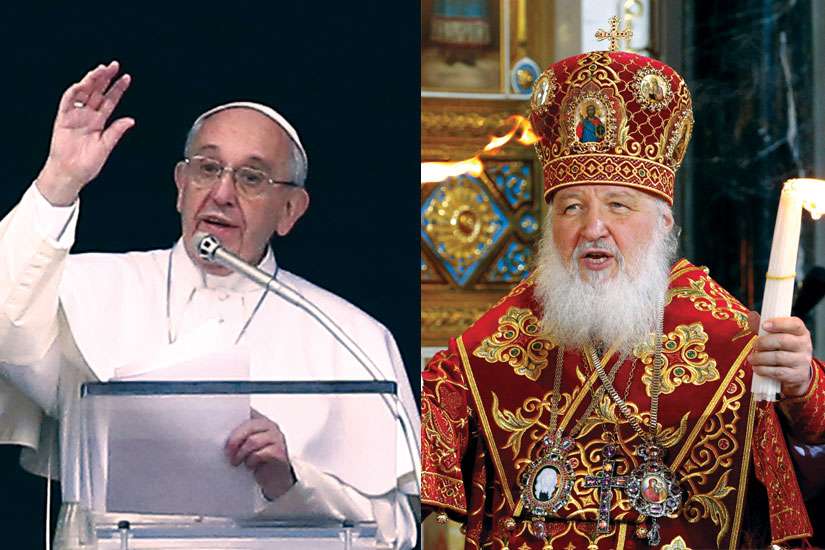“We want this. It’s about time… If anything we would like for these meetings to happen more often,” said Fr. Peter Galadza, acting director of the Sheptytsky Institute at Saint Paul University in Ottawa. “We don’t want to return to the old ostpolitik where the Eastern Catholic churches, especially the Ukrainian Catholic Church, get thrown under the bus.”
The very first meeting between a pope and the head of the Russian Orthodox Church was to take place Feb. 12 at José Martí International Airport in Havana, Cuba. On the agenda is a personal conversation between Pope Francis and Patriarch Kirill of Moscow, followed by the signing of a joint declaration. The Vatican and Moscow have agreed the meeting will address the plight of persecuted Christians in the Middle East.
Pope Francis will be stopping in Havana on his way to a five-day visit to Mexico. Kirill is making an official visit to Cuba.
There have been on-andoff negotiations for a meeting between pope and patriarch since the early days of St. John Paul II. Often Moscow has objected on the basis of supposed Catholic proselytism in Russian Orthodox lands. Moscow has protested even the existence of the Ukrainian Catholic Church, which Russian Orthodox leaders have called an illegitimate “uniate” church.
Under Soviet rule the Ukrainian Catholic Church was declared illegal and the Russian Orthodox Church enjoyed the status of an official, state-backed church within Ukraine. After a politicized, Soviet-controlled synod in 1946, Ukrainian Catholic parishes were declared Orthodox or shut down completely. With the collapse of the Soviet empire in the 1990s, many of those parishes reverted to their Catholic roots. But the switch from Moscow to Rome was not always smooth. In a few cases there were gun battles over churches.
Catholics and Orthodox accuse each other of violence and dirty politics in the realignment of churches during the 1990s. In 2004, Pope John Paul II tried to turn the page on the tumultuous era by sending a delegation to Moscow to return an 18th-century copy of the ancient Russian icon the Madonna of Kazan. While the delegation from Rome presented the icon to the Moscow patriarch the sound system in the cathedral was suddenly cut off so nobody could hear the Vatican’s offer of peace and ecumenical fellowship. Meanwhile outside the church a spokesman for the patriarchate was telling a Russian broadcaster that until Rome stopped promoting Catholicism in Ukraine the gesture meant nothing.
Hope for ecumenical dialogue rose with the election of Kirill in February of 2009. Kirill had been chair of the Russian Orthodox Church’s department for external church relations.
With civil war pitting mostly Orthodox eastern Ukraine against mostly Catholic western Ukraine, Ukrainian Catholics the world over want to see Pope Francis employ his talent for blunt, plain speech in his meeting with Kirill.
“The greatest hope that the Ukrainian Catholics have with regards to this Pope is the Pope’s parrhesia, the Greek word for bold speech, will be used in his conversations with Patriarch Kirill,” said Galadza. “We’re a small Church in a poor country that doesn’t have the kind of natural resources or economic power that Russia has. As a result of that we were a bargaining chip during the period of ostpolitik (Cold War accommodation of the Soviet empire) and we’re always worried that in some new political configuration we will again be a pawn on a chessboard where obviously others are calling the shots.”
Archbishop Sviatos lav Shevchuk, major archbishop of all Ukrainian Catholics, also hopes Pope Francis comes to the defence of Ukraine in its fight with Russian- backed forces.
“I hope that His Holiness Pope Francis, who always raises his voice in defence of the wronged, will be a voice for Ukrainians, who are engaged in a battle for the unity and integrity of their land,” said Shevchuk.
As an Argentinian, Pope Francis represents a definite break from Cold War frame of mind which dominated the Vatican under Pope John Paul II and Pope Benedict XVI — two European popes whose views were formed in the aftermath of the Second World War.
“You talk about Francis being the first post-Cold War pontiff, and you’re absolutely right,” said Galadza. “Unfortunately Kirill and (Metropolitan Hilarion) Alfayev are not post-KGB. Patriarch Kirill had a KGB code name (‘Mikhailov’). This is going to colour different aspects of his behaviour.”
A meeting between the Patriarch of Rome and the Patriarch of Moscow also has important implications for internal Orthodox politics. The largest and most important synod of Orthodox bishops since 872 is scheduled for this June on the island of Crete. The meeting is a major accomplishment for Patriarch Bartholomew of Constantinople, the most important Orthodox patriarch in the world.
“To the extent that Patriarch Bartholomew really has demonstrated ecumenical good will, Patriarch Kirill doesn’t want to be left behind,” Galadza said. “He wants to demonstrate that he’s a player.”
Warm relations and frequent meetings between Patriarch Bartholomew and Pope Francis have set a new ecumenical agenda for both Catholic and Orthodox communions. Galadza believes Ukrainian Catholics can play an important role in a future of reconciled diversity — a state of intercommunion between Orthodox and Catholic that respects the history, culture and traditions of both churches.
“It’s really tragic that there are many Orthodox in the world who still do not understand the way in which Eastern Catholics desire to be their greatest allies,” he said.

